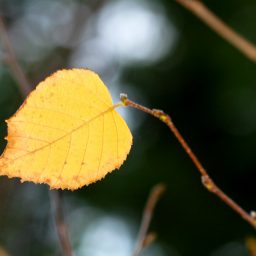“Six,” said Johnsy, in almost a whisper. “They’re falling faster now. Three days ago there were almost a hundred. It made my head ache to count them. But now it’s easy. There goes another one. There are only five left now.”
—From “The Last Leaf,” by O. Henry
As the last leaves dance in the sky, falling to the earthen floor below, it is at this time every year I turn to what is undoubtedly my favorite short story of all-time, “The Last Leaf,” by O. Henry. A synopsis of the story is that a woman nicknamed Johnsy is close to death from pneumonia. Outside her window, she sees the leaves fall one by one and decides that when the last leaf falls, she will die. It was a story I was introduced to years before that became, for me, an unrivaled template for the short story form; and, even more than this, a template for love and appreciation of the human condition. [1]
When my wife Allison and I were dating, and I was still a student at the University of Virginia, there was a time she was stricken with the flu. It hit her a little harder than is typical of someone her age in good health. She lost a fair amount of weight and was unable to keep anything down, and nearly fainted when walking from her bedroom to the kitchen because she was so weak. She missed a total of two weeks from work, where she served as an elementary school counselor in Colonial Heights, Virginia, at the time.
During her bout with influenza, every evening after my last class of the day at U.Va., I would hop into my car and drive the distance between Charlottesville (where I lived and went to school) and Richmond where her apartment was to make her dinner [2] and run errands for her, as well as to keep her company, and make sure she was stocked up on flu-proof food and beverages such as chicken noodle soup, gatorade, and popsicles. Fresh air was important, I told her, and so, one afternoon, I convinced her to step out onto the balcony to sit with me. There was a slight chill to the air, but it was otherwise pleasant.
“You can bring your blanket and wrap up,” I said to further convince her. She didn’t object. Once outside, we sat under a thick winter’s blanket. We talked a little, and there was a portly woman of about 54 in age, who clutched her bible by her side that below us walked on the grass to the right of the sidewalk.
“She won’t walk on the sidewalk where everyone else walks,” my wife said. “I see her every day. It doesn’t matter if anyone is walking on the sidewalk or not.”
The portly woman had her own path to be exact, worn white into the grass that led to her car. After this curiosity, I reached into my coat pocket and retrieved a folded copy of “The Last Leaf,” by O. Henry that I had printed prior to my departure from Charlottesville earlier in the day.
“Don’t laugh at me,” I said to my then-girlfriend. “I’m going to read you a short story.”
“I won’t,” she said.
“Okay, good, because I feel a little silly. Maybe I shouldn’t, but I do, but I think you’ll really like this story. It might make you feel better.”
As she sipped on her hot tea, her knees bunched to her chest under the thick winter’s blanket, I began reading. By the time Behrman’s masterpiece is unveiled, my throat had grown dry and my nose ran a little from the cold air.
“What do you think?” I said.
“I think it’s beautiful.”
“I think so, too. Let’s go inside now.”
Once inside, I unzipped my laptop bag and pulled out my computer and placed it on top of her dresser.
“Since I’m on a do things that make me feel awkward kick today, I have one more.”
My future wife sat on the edge of the bed as I told her this.
“I promise you won’t be on your feet but a few minutes and then you can lay back down.”
I navigated my browser to YouTube and hit the ‘Play’ button.
“Don’t laugh,” I said to my wife as I pulled her up from the bed and put my arms around her hips. We began to dance, slowly.
Wise men say
Only fools rush in
But I can’t help falling in love with you . . .
Take my hand,
Take my whole life, too
For I can’t help falling in love with you.
Notes
[1] Seven years later when we welcomed our second child into the world, inquiring minds asked why the name Henry. “Is it a family name?” they wondered. Technically, yes, it is on the Pillow side, on a leaf on a branch far up high on the family tree. “No,” I said to them, “I just like the name Henry. Nothing to do with a family name or Henry David Thoreau either, for that matter.” The true story, however, has its origin on this day, the day I describe above—the day I read “The Last Leaf,” by O. Henry to my wife. “Henry,” or some version thereof found its way into numerous short stories I wrote during my time at U.Va. One, in particular, I came across in my email recently, a post-slavery narrative known as “The Valley of Dry Bones,” in which the lineage of Henrietta, mother to Tyrus from a short story (“Bovis”) I had written earlier that same year.
[2] I’m not going to claim to be a sous chef here. Her dinner consisted of chicken noodle soup and saltine crackers or tomato soup almost every single night during her bout with the flu.
Photo: Sharon Mollerus. “Last Leaf.” Licensed under CC-BY-2.0
